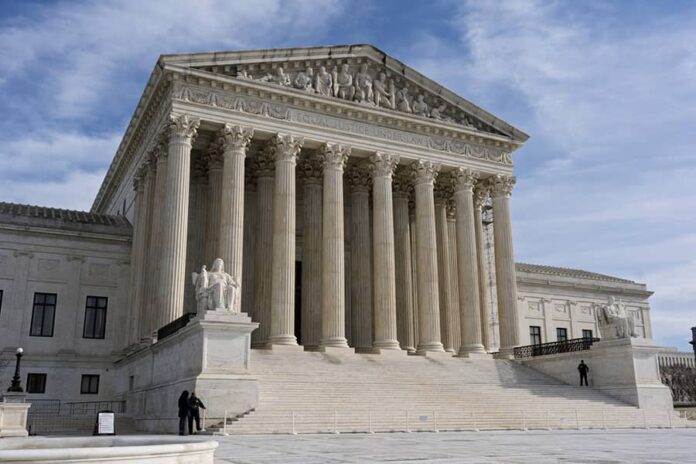President Donald Trump’s bid to expand his power to fire executive branch officials reached the Supreme Court on Sunday — the first of many fast-moving legal challenges during the early weeks of Trump’s second term to land at the high court.
Trump asked the justices to lift a lower-court order that temporarily reversed his dismissal of the head of a usually obscure office that enforces laws relating to federal employees.
The Trump administration decried the lower court’s order reinstating Office of Special Counsel chief Hampton Dellinger as a grave and unwarranted intrusion on presidential power that threatened the president’s ability to oversee the executive branch.
Trump fired Dellinger, an appointee of Joe Biden, on Feb. 7. Dellinger sued to get his job back, citing a federal statute that limits the ability of the president to remove the special counsel. A federal district judge agreed with Dellinger and ordered the Trump administration to allow him back in his job while litigation proceeded.
Late Saturday, a divided appeals court panel declined to disturb the district judge’s order, prompting the Trump administration to go to the Supreme Court.
“This case involves an unprecedented assault on the separation of powers that warrants immediate relief,” acting Solicitor General Sarah Harris wrote in an emergency application.
Harris complained that the short-term restoration of Dellinger to his office inflicts “irreparable harm” on Trump’s “ability to manage the Executive Branch in the earliest days of his Administration.” And she asked the justices to step in now to ward off what she described as an even broader threat: a flurry of temporary restraining orders judges have issued in recent days against Trump’s initial executive orders on topics ranging from spending freezes to halting medical care for transgender youth.
“This Court should not allow the judiciary to govern by temporary restraining order and supplant the political accountability the Constitution ordains,” Harris warned, adding that the ruling in Dellinger’s case “risks further emboldening district courts to issue TROs enjoining the President from undertaking myriad other actions implicating executive powers.”
Harris’ muscular arguments for executive power did appear to rule out one option that Trump seemed to flirt with in recent days: simply defying the courts when they disagree with him. On Saturday, Trump posted to social media a provocative quote often attributed to Napoleon Bonaparte: “He who saves his Country does not violate any Law.” Trump’s message was quickly reposted by many of his appointees, including some at the Justice Department.
However, Harrington said in a footnote to her filing Sunday that the administration has scrupulously complied with the lower-court order to restore Dellinger and would continue to abide by court orders.
“The Executive Branch takes seriously its constitutional duty to comply with the orders of Article III courts, and it has fulfilled that duty here,” she wrote.
In addition to enforcing federal whistleblower laws, the office Dellinger heads investigates violations of the Hatch Act — the main statute limiting political activity by federal employees. The office also fields complaints from veterans about discrimination upon their return from military service.
Though Dellinger’s title is special counsel, his work is not related to the special counsels that the Justice Department sometimes appoints to investigate politically sensitive cases.
Dellinger is just one of several executive branch officials Trump has tried to fire, despite federal laws meant to protect the heads of so-called independent agencies from politically motivated terminations. Among those other officials is a member of the National Labor Relations Board, which hears complaints about unfair labor practices.
A nearly century-old Supreme Court precedent upheld federal laws that restrict the president’s ability to fire officials who run independent federal agencies. But the high court has narrowed that precedent in recent years, and some experts believe Trump’s firings may prompt the court to narrow it further or even overturn it.
By Josh Gerstein, politico

